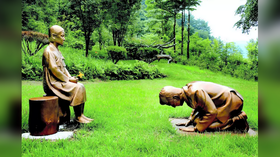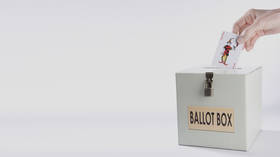Whoever replaces Shinzo Abe, Japan’s slow rot & subservience to US will likely continue
Do not judge Shinzo Abe’s Japan by those shiny new structures of the Tokyo Osaka maglev project that will be soon connecting the industrial heartland of Nagoya with the capital city.
Japan's longest-serving prime minister is stepping down, and the nation appears to be in shock. But people are stunned simply because the protocol was broken (even if unwell, ill, a Japanese leader is not supposed to abandon his post, abruptly), not because they are fearing or expecting great political, economic, or social upheavals. Japan is a country of continuity, and, during the last decades, of gradual and very slow decline.
Here, no one is expecting a revolution or collapse of the system to take place. Japan is the most stable and most predictable country on earth. It is a staunch Western ally, without its own foreign policy and very little of its own opinion about the world. Several decades ago, the country used to rebel – against capitalism and the Western rule – but the administrations of Koizumi and Abe broke the spine of rebellions, gently, by wrapping up the nation into a comfortable duvet, guaranteeing a mildly sclerotic but still cozy existence for the majority.
Shinzo Abe understands Japan. It is his country, and he is its native son. He also understands the establishment and how to deal with the United States. He is more pro-market than Trump, he despises North Korea more than the West does, and he is ‘politely’ but determinately antagonizing China.
China has been his huge ‘psychological problem’. It is because, in the past, Japan's collaboration with Washington ‘used to pay off’, at least in terms of the quality of life. Japan used to be the second-largest economy in the world, and its standard of living used to be much higher than in most Western countries.
Then the Chinese economy bypassed that of Japan. And soon after, Japanese travelers to the People’s Republic of China began returning with ‘frightening tales’: Chinese cities and the countryside were blooming. Chinese trains were suddenly running faster than shinkansen, Chinese museums and opera houses were more lavish than those in Japan, and the public spaces and social projects were dwarfing those in the increasingly capitalist Japan. Poverty levels in China are rapidly declining, while in Japan they are on a slow rise.
This was not supposed to be like that, Japanese people were exclaiming! Anti-Chinese sentiments erupted, and Shinzo Abe did nothing to stop them. On the contrary.
Instead of reforming and investing in the people, the two mightiest capitalist countries on earth – the United States under Trump and Japan under Abe – turned against China with unimaginable force and spite.
But under Abe, Japan began falling behind its other ancient rival, South Korea, too. And its arch-enemy, the country which Japan helped to destroy after WWII, North Korea (DPRK), is still there, undefeated and strong.
Instead of reimagining Japan, Shinzo Abe began censoring the past of the country, as well as its already submissive media.
My good friend, David McNeill, an Irish professor at the prestigious Sofia University in Tokyo, who also worked for the NHK, Japan’s national broadcaster, once explained to me:
“There is so much self-censorship in Japanese media, now. And the government is issuing ‘guidelines’, so called ‘Orange Book’, for instance: how to treat anything that is ‘contagious’... or anything related to history. There are instructions to writers and translators. For instance: never use words like Nanking Massacre, except when you quote foreign experts. Or Yasukuni Shrine – never use the word ‘controversial’ in connection to it.’ We cannot write about ‘sexual slaves’ from WWII.”
It is a well-known fact that Japanese mass media outlets do not take a position on any major world events related to Russia, China or Iran, until Western publications or networks such as the BBC or CNN provide ‘guidance’. I used to work for one of the major Japanese newspapers, when covering ‘sensitive’ international topics we had to seek permission to publish from the Ministry of Foreign Affairs.
Mr. Taira Takemoto, a civil engineer based in Osaka wrote for this report:
“Frankly speaking, Abe has spent lots of effort selling Japan to the US, with President Obama or President Trump. There are many pending issues that need to be sorted out from the 1960 US-Japan Security Treaty to the issue of numerous US bases to trade to an increasing hostility of Japan and the US toward China, as much as DPRK. In the international arena, I do think he has subjugated Japan to the hands of the West, in particular the US.”
Also on rt.com Shinzo Abe was an important world leader and leaves big shoes to fill*
Yet, forget about Tokyo for a while. To understand today’s Japan, visit its central part, urban and rural, and you will understand how deep the rot under Abe was. Outside cities like Suzuka or Yokkaichi in Mie Prefecture, rice fields and bamboo forests are dotted with rotting carcasses of cars. Many houses are in disrepair. The bus lines are abandoned. Main roads are lined up with unhealthy fast food joints, not unlike those in the US suburbia. Many public playgrounds for children are unmaintained or gone.
A once glorious cultural life has been decaying, even before the Covid-19 pandemic. Huge cultural centers, once the pride of the country, are mostly empty, with tall grass growing between the buildings.
Blue tents of homeless people are pitched in almost all public parks of Tokyo, Nagoya, Osaka, and other major cities.
Optimism is hard to come by.
Ms. Mikiko Aoki, a social worker, living in Nagoya, has mixed feelings about Shinzo Abe:
“The news of [the] PM’s resignation surprised us all as we did not see it coming. I guess we had gotten used to him.
I think he has presided over some important domestic works from the recovery of the big earthquake in 2011 to the preparation of the hosting of the postponed Tokyo Olympics. But the social situations in Japan are no better than before. In fact, I think they are worse, with the aging population and less investment of the state on public services and support to families in need. I don't think there will be any different with a new prime minister. After all, he will come from the same party! Nothing changes.”
Geoffrey Gunn, a leading Australian historian and Professor Emeritus at Nagasaki University, is concerned about Japan's increasingly aggressive role in the region:
“All changed when the Abe government nationalized the Senkaku/Diaoyu [Islands]. The status quo changed because now Japan declares that there is actually no dispute over these so-called disputed islands. Therefore, the Tokyo government has angered China. China is indignant with this change of the status quo.”
Also on rt.com Japan scraps plans for US-made anti-missile sites, but mulls pre-emptive strike options instead*
What is next should be much more important now than who comes next.
Unfortunately, in Japan, there is no expectation or hope for the essential political changes. Political clans divided the territory, surprises are very unlikely. Japan’s Communist Party has many members, but it is always weak when it comes to elections.
Japan will continue to decline, but extremely slowly, one could even say ‘elegantly’. The standard of living is still extremely high. The aging population will continue enjoying generous pensions and benefits but younger generations have been tightening their belts. The era of lifetime employment is over. Part-time jobs with no security are the only future for millions of young graduates.
Confrontations with China, the Koreas, and to some extent Russia will continue for years to come, or at least for as long as the United States will be igniting them.
Yoshihide Suga, 71 years old and often described as a ‘lieutenant’ of Mr. Abe, is expected to ‘join the race’ for the Liberal Democratic Party (LDP) nomination. Were he to ‘win’, not much would change, except that he may be less cautious regarding Covid-19. Japan's hermetically closed borders could open, and foreign tourists and business travelers could be welcomed, a scenario not unlike that in some European countries. Little more would change.
During our conversation, David McNeill passed an unflattering verdict on Abe’s era:
“Abe will probably be seen as a political caretaker rather than the conservative radical he set out to be. The fact that he failed to rewrite the hated constitution means he will probably see the last seven and a half years as a failure.”
And Suga? David replied without hesitation:
“On this, I agree with Koichi Nakano who wrote for the New York Times: ‘Suga will attempt to continue Abe politics without Abe, like John Major after Thatcher.’”
As for me, being locked out of Japan, one of my homes, for the entire six months, is a tragedy.
Prime ministers come and go. Occupation armies will, one day, disappear as well. Rotting car carcasses will fully decompose. But the depth of Japan, as well as its beauty, will never vanish. Frustrated Japanophiles are bitching about the country, but stay.
Think your friends would be interested? Share this story!
The statements, views and opinions expressed in this column are solely those of the author and do not necessarily represent those of RT.

















